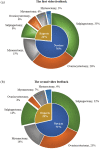How to minimize the impact of COVID-19 on laparoendoscopic single-site surgery training?
- PMID: 35594058
- PMCID: PMC9347803
- DOI: 10.1111/ans.17819
How to minimize the impact of COVID-19 on laparoendoscopic single-site surgery training?
Abstract
Background: Because of special technical challenges, laparoendoscopic single-site surgery (LESS) has been introduced into surgical practice, with surgeons required to have adequate training. The COVID-19 pandemic has significantly affected every aspect of healthcare systems, including LESS training, which must be modified to minimize the impact of the COVID-19 pandemic.
Methods: A 3-session training programme was designed in 2020 during the epidemic, which was modified in 2019 before the pandemic. Session 1 was an online study on LESS knowledge. Session 2 involved the trainees' self-directed simulator-training. Task performance was evaluated using the fundamentals of laparoscopic surgery (FLS) scoring. Session 3 was practical training, including trainers' live surgical video demonstrations and trainees' surgical video feedback after training. Video feedback performance was evaluated using the modified global rating scale (GRS). Furthermore, trainees completed a general self-efficacy (GSE) instrument. Forty-two gynaecology trainees were allocated into two groups: novices (n = 32) and experts (n = 10).
Results: Compared with pre-training, FLS scores improved in peg transfer (P < 0.001 and P = 0.01) and pattern cutting (P = 0.02 and P < 0.001) for novices and experts, respectively. Participants (81% versus 67%) provided first and second video feedback, respectively. Compared to the first feedback, the GRS scores of both groups improved significantly in the second feedback. All trainees showed an increase in GSE after training (P < 0.001).
Conclusion: The modified LESS training programme is a practical and effective option that allows trainees to continue training during the epidemic.
Keywords: COVID-19; LESS; laparoendoscopic single-site surgery; pandemic; surgical training.
© 2022 Royal Australasian College of Surgeons.
Conflict of interest statement
None declared.
Figures




References
MeSH terms
Grants and funding
LinkOut - more resources
Full Text Sources
Medical

